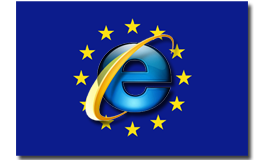IE Rivals Oppose Ballot-Screen Solution for EU
Internet Explorer rivals are opposing the company's proposal for a ballot screen that would allow users to choose which browser they want to use.
A recent report in the Wall Street Journal quotes the European Committee for Interoperable Systems (ECIS), an industry organization whose members include Opera, Adobe Systems, IBM, Oracle, Red Hat, and Sun Microsystems, says Microsoft's proposed "ballot screen" isn’t a solution.
According to ComputerWorld, Thomas Vinje, an attorney and spokesperson for the ECIS told the WSJ that choosing another browser requires "the user to confirm and answer threatening and confusing warnings and questions."
"Microsoft has cunningly found a way to accept the commission's suggestion of a ballot screen, but to do so in a way that will be entirely ineffective," said Vinje.
The news comes just a few weeks after Mozilla Foundation chair Mitchell Baker criticized the ballot proposal. In a blog post, Baker argued that the agreement still offers "Internet Explorer a uniquely privileged position on Windows installations," in that even if a user does not choose IE as their default browser on the ballot screen, a shortcut is still placed on the user's desktop.
Check out the full story here.
Get Tom's Hardware's best news and in-depth reviews, straight to your inbox.

Jane McEntegart is a writer, editor, and marketing communications professional with 17 years of experience in the technology industry. She has written about a wide range of technology topics, including smartphones, tablets, and game consoles. Her articles have been published in Tom's Guide, Tom's Hardware, MobileSyrup, and Edge Up.
-
I demand that every time Opera, Adobe Systems, IBM, Oracle, Red Hat, and Sun Microsystems software is installed it gives me the chance to choose an alternate competing product!Reply
Are these companies frickin' serious?! I'm no MS fanboy, but it's already ridiculous that MS has to even allow the option...and these companies are crying all butthurt that it's not enough! Unbelievable! -
cappster A simple solution is for the user to select the default browser of choice, delete the shortcut, and the problem is solved. I would hope that just about anybody who is taking on the task of installing windows has at least a functional amount of working IT knowledge and can choose their own web browser.Reply -
zak_mckraken I don't know for you, but I'd be damn pissed if someone would tell what and what not to do with MY product. It's not like they're forced to use Windows. Microsoft should stop this madness once and for all and stop selling Windows in the EU. "You don't want IE in Windows? How about no Windows at all? Have fun with Linux, EU!"Reply -
hixbot I don't understand the difference, they are all free products. Does Mozilla lose money when someone picks IE?Reply -
It's like telling Ford they can't bring out a new model anymore with their own custom tires, because many users prefer Michelin tires!Reply
-
ryanegeiger First of all, I don't recall SnowLeopard giving you the option to NOT install Safari on the system, and that's not even the update engine it uses for the OS.Reply
Anyway... this is probably the most worthless arguement in history. EVERY system comes pre-loaded with software. Norton/McAfee, WildTangent... etc. etc. Windows has been designed with an integrated browser for a very long time because it's considered part of having a software operating system. Can you imagine a Blackberry without the Blackberry browser, or an iPhone without Safari? Sure you can install others, but how would you get there?
MS, my advice, remove IE from the system, don't include an internet browser, and include a "free trial" disc with IE loaded on it. If the customer wants to download a different browser... uhh... through... uhh... someone else's computer... and then... uh... load that on a flash drive... then bring it back to their PC, they can do that.
Offer the OEM's an 'option' to include a "Free Preloaded" version of Internet Explorer at the cost of... say... $.01 (which is exactly what the retail value of say, a free trial disc of AOL is) and give them the option to not take it. Problem solved. -
rcmaniac25 They probably want their product to be installed instead of IE. What if the user doesn't want that web browser? They uninstall it and they are stuck with no web browser. Unlike the people on this site most people are completly clueless, you need to tell them the exact, for THEIR computer, how to install the web browser. These companies want to increase there marketshare regardless of if the user knows what they are doing or if they mess up anything the user tries to do.Reply -
IzzyCraft dam edit killed my post.Reply
Anyways it's a MS product they already was forced to put your shitty crap all on their os why can't they just leave them alone already or ask that MS become Open source in the EU because obviously providing a product that isn't by nature harmful is no longer good enough to be left alone in the EU.
Hell give me the option to install WindowsLive toolbar or yahoo toolbar, I don't want to always see install Google toolbar that company has a like 70% monopoly on the search industry and all these programs offer if i would like to install google toolbar i find it's unfair to the other companies.
